What Is Dutching? Ultimate Guide
If you’re fed up with betting on a single outcome and losing more often than you win, dutching might be the strategy for you.
With dutching, you can reduce your risk and increase your chance of winning.
Dutching involves placing more than one bet on a particular market of an event. Although only one of these bets can win, as long as the odds are high enough, you'll profit if any bet is successful.
This guide will explain the pros and cons of dutching, how it works, how you can use it to increase your chances of winning, and how it can be used in Matched Betting to lock in a profit, no matter what the outcome.
The Origin Of Dutching
Many sources suggest that dutching is named after the notorious New York City gangster Arthur Simon Flegenheimer, known as Dutch Schultz.
He made a fortune through a range of criminal activities, including at the racetrack, and it’s possible he originated the idea of dutching there.
However, it’s difficult to find any reliable and verifiable sources of information about this claim, so this may be no more than urban legend.
What Is Dutching?
Dutching is a betting system that involves placing multiple bets on the same betting market.
Spreading your bets across multiple outcomes reduces your risk and increases the likelihood of a winning bet.
An example is betting on two horses to win a particular race. Although only one horse can win, as long as the odds on each horse are high enough, you’ll make an overall profit if either of them wins.
Types Of Dutching
There are several different dutching strategies, which are summarised below. We’ll look at each in more detail later.
- Equal stake dutching
- Adjusting stakes to make the same overall profit no matter which bet wins
- Covering all outcomes (arbitrage)
Equal Stake Dutching
This involves staking the same amount for each outcome, regardless of odds.
Example 1 - Dutching 2 Horses
You might decide to increase your chances of winning by staking £10 on Park Annonciade and another £10 on Imaginary Dragon in this race:
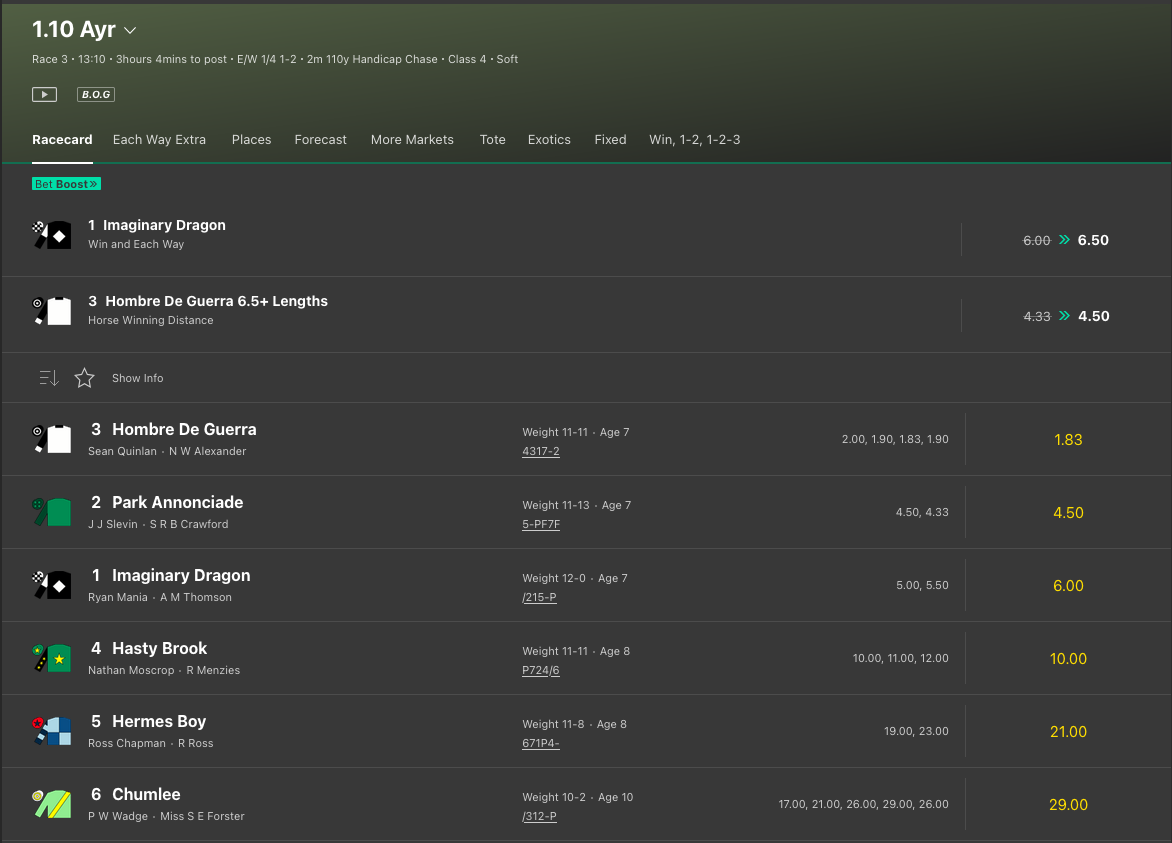
Here are the three possible outcomes:
Park Annonciade wins
- Return on bet = £10 x 4.5 = £45
- Overall profit = £45 - £20 = £25
Imaginary Dragon wins
- Return on bet = £10 x 6.5 = £65
- Overall profit = £65 - £20 = £45
Neither horse wins
- Return on bet = £0
- Overall loss = £10 + £10 = £20
As you can see, you’ll make a profit if either of your backed horses wins, but the profit will depend on which horse wins. If neither of your horses wins, you’ll lose the full £20 staked.
We’ll see next how you can adjust your stakes to give the same profit no matter which horse wins.
Balancing Stakes To Give Equal Profit
To make the same profit no matter which of your horses wins, you need to use a different stake for each horse.
You’ll often want to use a certain total combined stake and divide this across your bets.
Using A Total Combined Stake
If you want to use the same total £20 stake as before and divide this between your bets, you’ll need to calculate the stake for each of the horses.
Here’s the process used to calculate the stakes.
- Calculate the implied probabilities by using the odds of all the selections
- Calculate the sum of all the implied probabilities
- To calculate the stake of each selection, divide its implied probability by the sum of probabilities, then multiply by the total combined stake
Now let’s follow this process to work out the stakes for the two horses from the previous race.
- Total stake = £20
- Park Annonciade odds = 4.5
- Imaginary Dragon odds = 6
Implied probabilities
To work out the implied probability, divide 1 by the decimal odds. The implied probability is the likelihood that the bet will win, based on the odds.
If the odds on a horse are fair, the implied probability will be the same as the actual probability of the horse winning.
Bookmakers will normally reduce the odds from fair odds to factor in a margin and ensure their betting markets are profitable in the long term, irrespective of the outcome.
Here are the implied probabilities for the two horses:
- Park Annonciade implied probability = 1 / 4.5 = 0.22222
- Imaginary Dragon implied probability = 1 / 6 = 0.16666
- Sum of implied probabilities = 0.22222 + 0.16666 = 0.38888
Calculating stakes
- Park Annonciade stake = (0.22222 / 0.38888) x £20 = £11.43
- Imaginary Dragon stake = (0.16666 / 0.38888) x £20 = £8.57
Overall profits
Result: Park Annonciade wins
- Return on winning bet = £11.43 x 4.5 = £51.44
- Overall profit = £51.44 - £20 = £31.44
Result: Imaginary Dragon wins
- Return on winning bet = £8.57 x 6 = £51.42
- Overall profit = £51.42 - £20 = £31.42
Result; Neither horse wins
- Return on bets = £0
- Overall loss = £11.43 + £8.57 = £20
If this all sounds a bit complicated, don't worry! You can use a Dutching Calculator to greatly simplify the process.
Here’s a screenshot of Outplayed's Dutching Calculator, with Total Stake Override set to £20, for the example above:
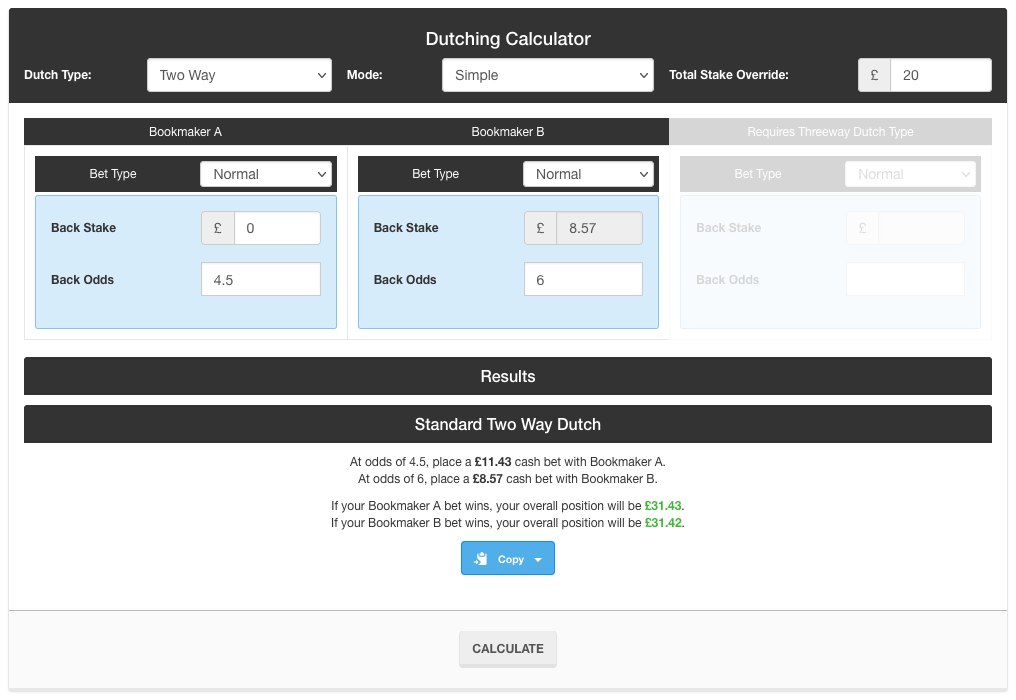
The Dutching Calculator shows you the required stakes and the profit you’ll make if either of the bets wins.
Example 2 - Dutching 3 Horses
Below is a screenshot of another horse race, showing the odds of the lowest odds horses:
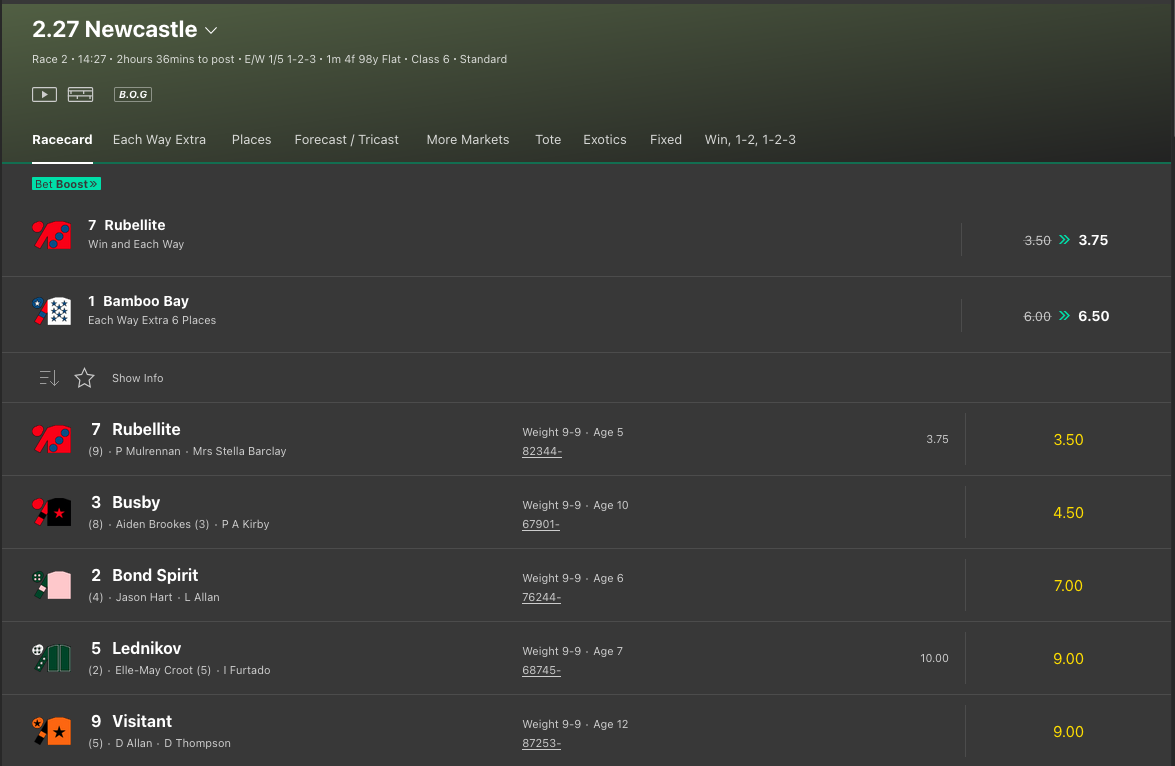
If you wanted to increase your chances of winning, you could use dutching to split your stake over the first three horses.
We’re going to use a £50 total stake and divide this by the three bets to make the same profit if any of them win.
- Total stake = £50
- Rubelite odds = 3.5
- Busby odds = 4.5
- Bond Spirit odds = 7
Implied probabilities
- Rubelite implied probability = 1 / 3.5 = 0.28571
- Busby implied probability = 1 / 4.5 = 0.22222
- Bond Spirit implied probability = 1 / 7 = 0.14286
- Sum of implied probabilities = 0.28571 + 0.22222 + 0.14286 = 0.65079
Calculating stakes
- Rubelite stake = (0.28571 / 0.65079) x £50 = £21.95
- Busby stake = (0.22222 / 0.65079) x £50 = £17.07
- Bond Spirit stake = (0.14286 / 0.65079) x £50 = £10.98
Overall profits
Result: Rubelite wins
- Return on winning bet = £21.95 x 3.5 = £76.83
- Overall profit = £76.83 - £50 = £26.83
Result: Busby wins
- Return on winning bet = £17.07 x 4.5 = £76.82
- Overall profit = £76.82 - £50 = £26.82
Result: Bond Spirit wins
- Return on winning bet = £10.98 x 7 = £76.86
- Overall profit = £76.86 - £50 = £26.86
Result: None of the horses wins
- Return on winning bet = £0
- Overall loss = £21.95 + £17.07 + £10.98 = £50
Again, we can use a Dutching Calculator to easily find the stakes for the individual horses.
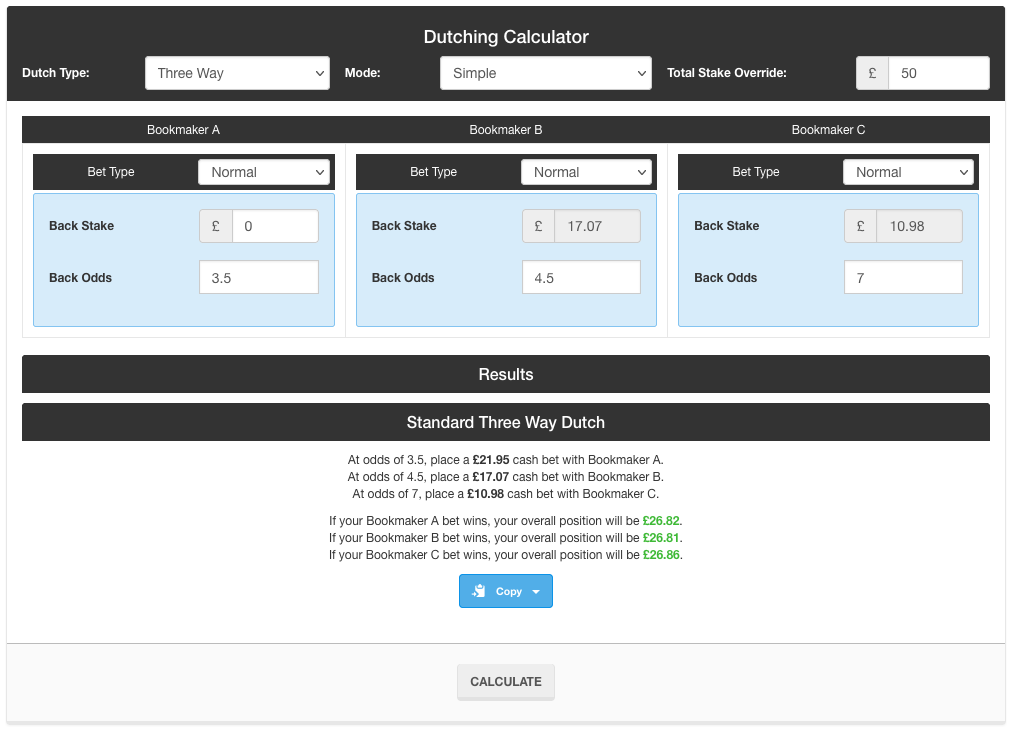
Using Dutching For Matched Betting
When Matched Betting, you’ll normally be backing and laying your bets to cover all outcomes.
An alternative is to cover all possibilities by dutching, which involves placing back bets on all outcomes in the market you’re betting on.
You’ll normally find it’s more profitable to back and lay rather than dutching. However, there can be certain situations where dutching is to your advantage.
Tennis
If you’re betting on the match result market of a tennis match and the tennis retirement rules of the bookmaker you’re betting with don’t match with the exchanges, you’ll need to dutch your bet with another bookmaker in the same group.
Here’s an example of a tennis offer listed by Outplayed, where you’d need to use dutching if you chose to bet on the match result market:
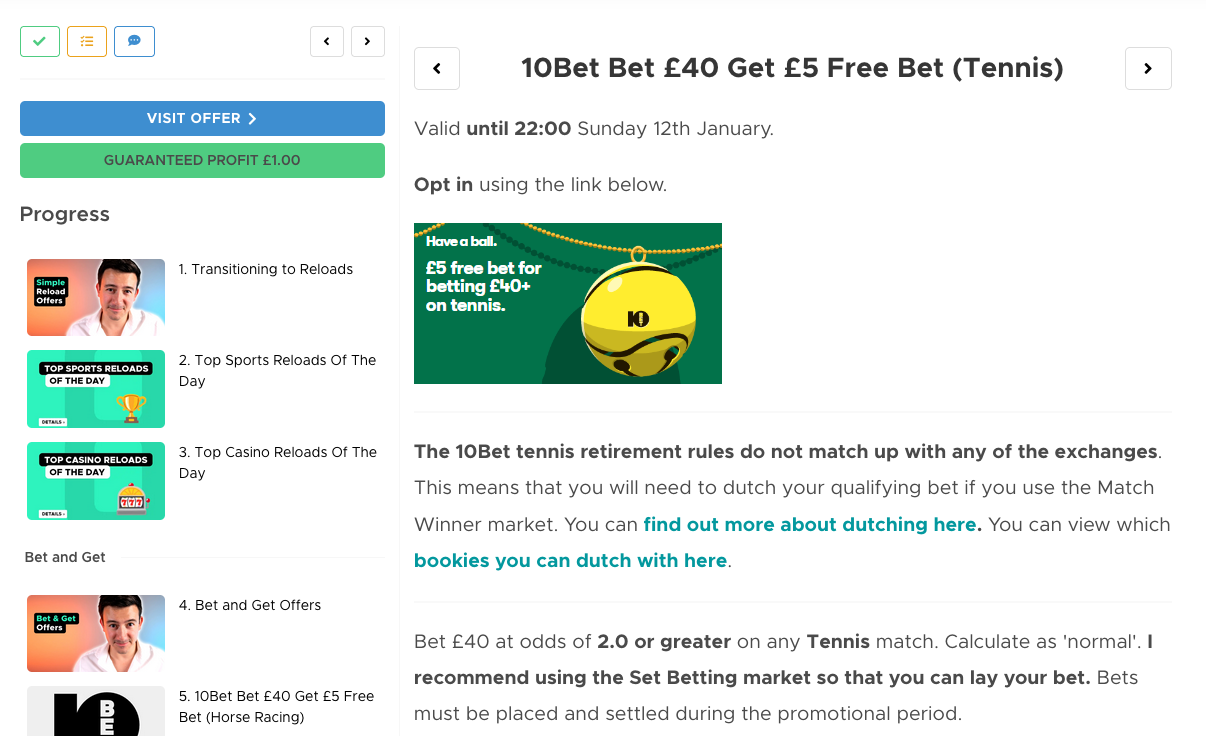
The guide recommends using the Set Betting market, which allows you to lay your bets. However, you could choose the match result market and dutch your bet with another bookmaker in the same group, like William Hill.
Here are the odds for 10Bet:

The Cameron Norrie bet has odds of 2.0 or greater, so you can use this for your 10Bet qualifying bet.
Kei Nishikori is at 1.80 odds at William Hill, so if you place a back bet at William Hill, this covers all outcomes:

You won’t have any issues if one of the players retires from the match since the tennis retirement rules match.
Again, you can use Outplayed's handy Dutching Calculator to tell you the stake for the William Hill bet:
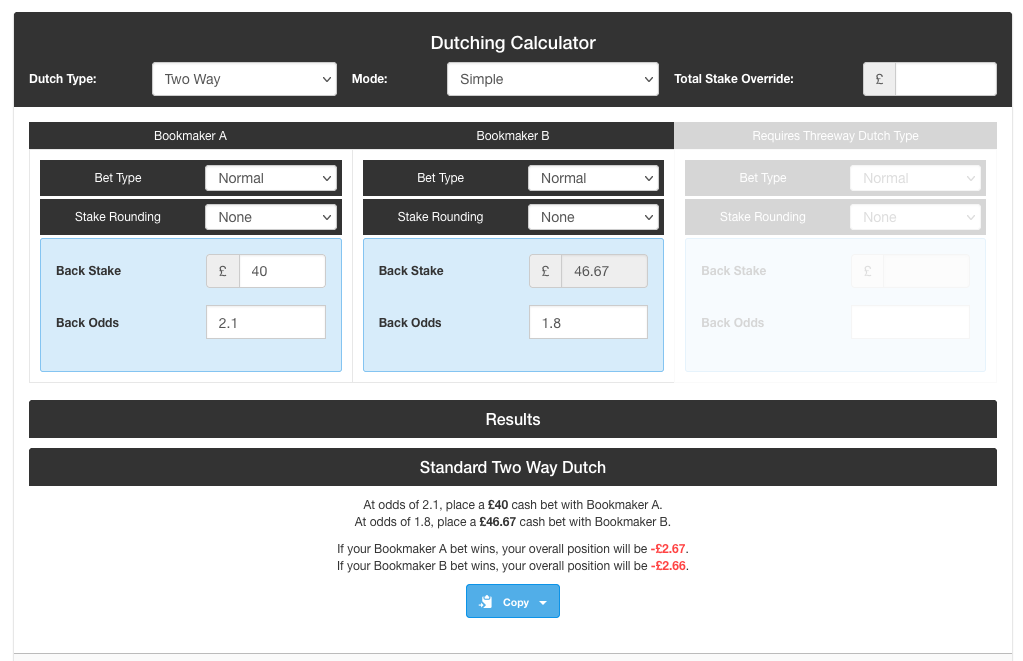
Since a stake of £46.67 at William Hill might look suspicious, you can round the Bookmaker 2 stake to the nearest pound. This gives a slightly different overall position depending on the outcome, but avoids the suspicious stake:
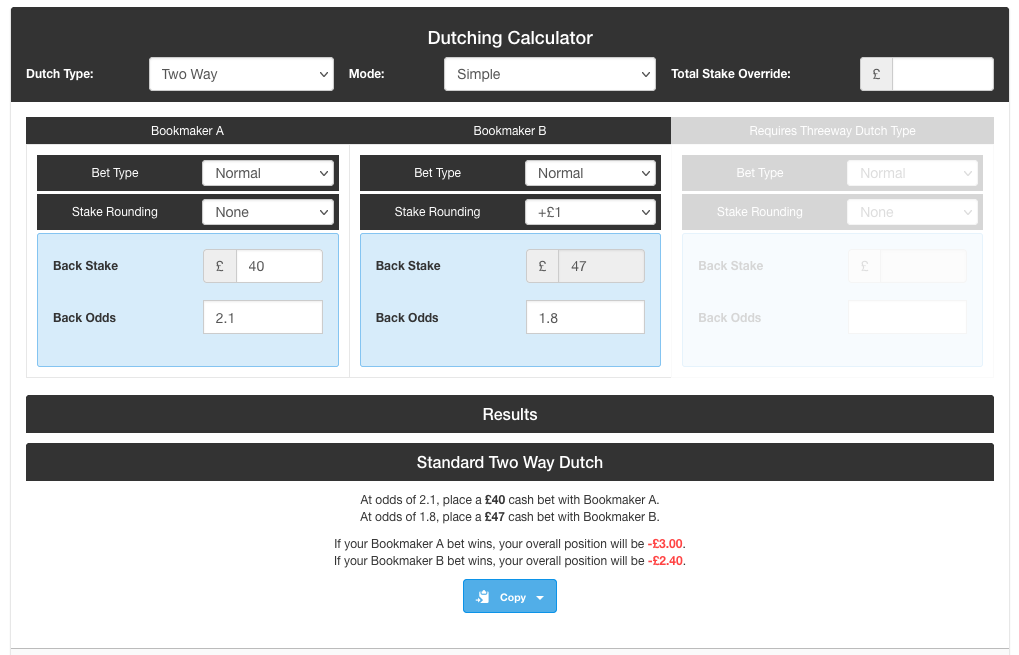
With the stake rounding, your worst overall position would be a £3 qualifying loss.
The offer gives you a £5 free bet after placing your qualifying bet. This can be used on anything, so can be backed and laid easily.
You can normally lock in a profit of around £4 from a £5 bet.
This gives a minimum profit of £1, after deducting the maximum qualifying loss of £3 from the qualifying bet, which is the suggested ‘guaranteed profit’ for the offer.
Limited Liquidity
Dutching can also be very useful for Matched Betting if there isn’t enough liquidity at the betting exchanges to cover your required lay stake.
Instead of backing and laying your bet, you can dutch it with one or more other bookmakers.
The Outplayed Dutching Calculator has a Three Way Dutch Type. This means you can dutch the match result market of a football match if you need to, by backing the home team with one bookmaker, the away team with another, and the draw with a third.
Using Dutching For Arbitrage
If you can find odds that are good enough, it’s possible to lock in a profit by dutching all outcomes. This is a form of arbitrage (arbing).
Arbitrage is very bad for account health, so you should only do it with bookmakers you’re already gubbed with if you’re Matched Betting.
One way to find possible arbitrage opportunities is to use Outplayed’s Oddsmatcher.
Here’s an example of an arbing opportunity on an Australian A-League match:

You can use Outplayed’s Oddsmatcher or an odds-checking site like Oddschecker to find the best odds for the other two outcomes.

Betvictor, who are in the same group as TalkSportBet and share odds, have Western United FC at odds of 4.
The best odds for Melbourne City are 1.91, from Paddy Power or Betfair Sportsbook. The best draw odds can be found at Bet365 or Coral.
Entering these odds into Outplayed’s Dutching Calculator shows you can lock in a modest profit by dutching all three outcomes with bets on TalkSportBet, Paddy Power, and Coral.
In this case, you’d make more profit by backing and laying the Western United FC bet with Smarkets, using their lay odds of 3.65.
You can see this by entering the bet into Outplayed’s Matched Betting Calculator:
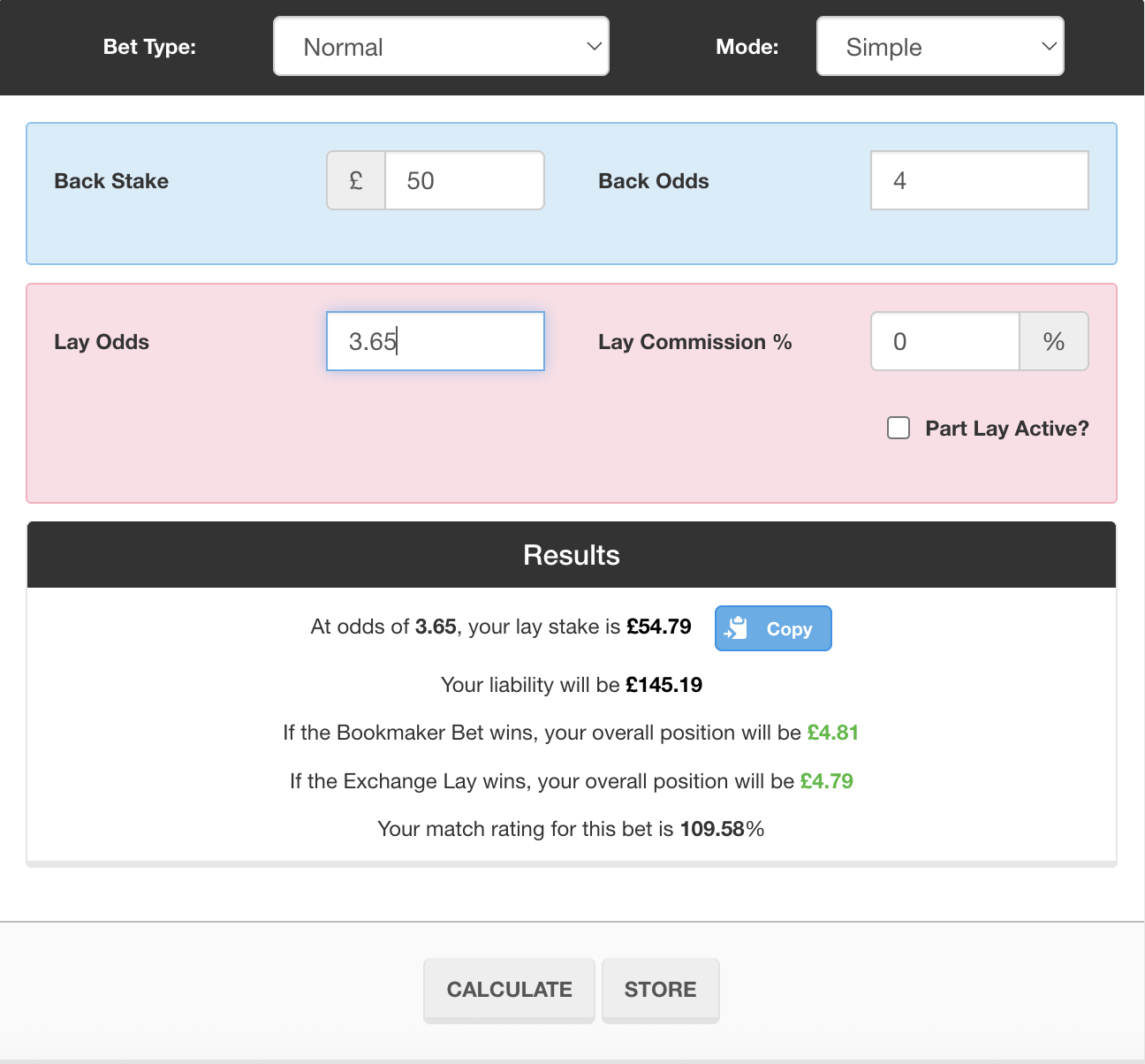
Pros And Cons Of Dutching
As with any betting strategy, dutching comes with advantages and disadvantages. Here’s a summary of some of these.
Pros
- Allows you to bet on the match result market of a tennis match when Matched Betting if the bookmaker has different tennis retirement rules to the betting exchanges
- Can be used to reduce your risk and increase the likelihood of your bets winning
- Useful when Matched Betting on markets with low liquidity
- Opens up arbitrage opportunities
Cons
- Backing and laying a bet will often give a better overall position than dutching the bet
- When dutching to achieve the same overall position no matter the outcome, the required stakes are usually ‘suspicious’ amounts that could potentially lead to issues with bookmaker account health. This can be overcome by rounding stakes to the nearest £1
Conclusion
Whether you’re Matched Betting, arbing, or just trying to increase your chances of a
winning bet by backing more than one outcome, dutching is a powerful
strategy that’s great to have in your betting arsenal.
You can find out how you can make long-term profits through Matched Betting and Value Betting with Outplayed membership.
Updated: 18 Feb 2026
The Author
Simon has helped thousands of members profit from Matched Betting using both his passion for writing and desire to understand how things work. He has used his mathematical and analytical skills to create several guides, calculators, betting and casino tools to make the process of Matched Betting easier for newcomers and experienced members alike.

